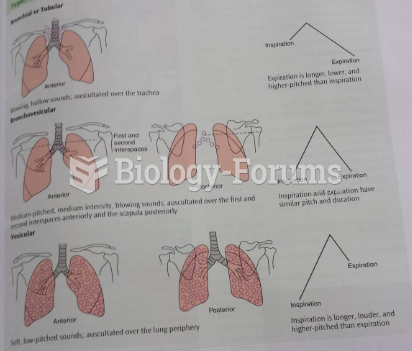|
|
|
More than 34,000 trademarked medication names and more than 10,000 generic medication names are in use in the United States.
Chronic necrotizing aspergillosis has a slowly progressive process that, unlike invasive aspergillosis, does not spread to other organ systems or the blood vessels. It most often affects middle-aged and elderly individuals, spreading to surrounding tissue in the lungs. The disease often does not respond to conventionally successful treatments, and requires individualized therapies in order to keep it from becoming life-threatening.
Approximately one in four people diagnosed with diabetes will develop foot problems. Of these, about one-third will require lower extremity amputation.
Liver spots have nothing whatsoever to do with the liver. They are a type of freckles commonly seen in older adults who have been out in the sun without sufficient sunscreen.
The immune system needs 9.5 hours of sleep in total darkness to recharge completely.
 Human immunodeficiency virus gains entry into helper T cells, uses the cell DNA to replicate, interf
Human immunodeficiency virus gains entry into helper T cells, uses the cell DNA to replicate, interf
 Inline four-cylinder engine showing principal and nonprincipal ends. Normal direction of rotation is ...
Inline four-cylinder engine showing principal and nonprincipal ends. Normal direction of rotation is ...





